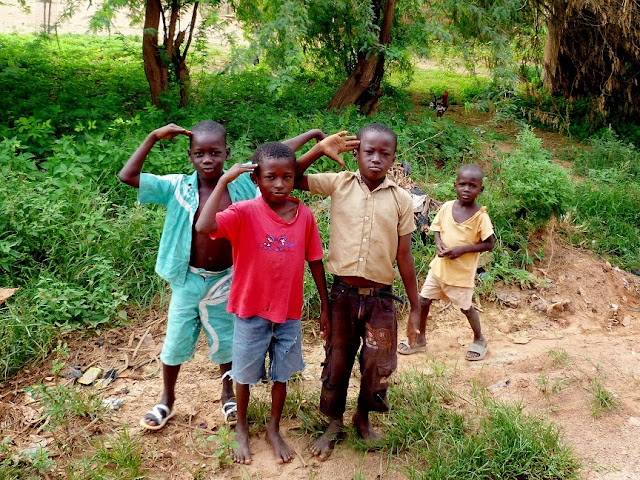'Burkina
Faso' roughly translates to the land of the honest (or 'upright') men (pays des hommes intègres), in the
country's two main languages. It's a landlocked country of 16 million, with 60
languages and ethnicities, and French is the sole official language. It borders
Mali, Ghana, Togo, Benin, Niger and Cote d'Ivoire. It is majority Muslim but
with a sizable Christian minority.
Two gods are better than one?
Religion in Burkina is a fascinating topic. Despite 80% being
either Muslim or Christian, nearly all nonetheless practise traditional
beliefs. Goat sacrifices seem to be perfectly compatible with going to church
every Sunday. The level of religious belief can also clearly be seen from the
multitude of pietistic shop names. Many contain the prefix 'wend', which means
'god' in Mooré. 'Shalom' and 'peace' (paix)
are also seen everywhere.
In addition, the traditional chiefs are still highly regarded
in Burkinabé society. There are apparently some still-observed customs whereby
women greeting the chief must approach him
by crawling on their hands and knees. Monsieur le Président Blaise Compaoré is
also said to exercise power through the traditional chiefs who can often
disseminate messages to communities in a way that no political TV ad or garish
billboard could. It is widely believed that he regularly consults the Mossi
king.
 |
| Photo: Shalom Coiffure |
Jovial racism
The
multitude of different ethnicities is personified through friendly rivalry and
banter (plaisanterie). Although the
Kingdom of Ouagadougou is predominantly the Mossi tribe, the capital is a
magnet for migration from across the Republic. While taking breakfast with a
couple of elders - one Mossi, one Dioula - I was entertained by non-stop back-and-forth
joshing of "he's Mossi, he eats people", "he's Dioula, he's a
slave".. "he's a thief"... "he eats children" ...
"he doesn't wear underwear"; and so on, punctuated with friendly jabs
and the trademark Burkinabé smirk. It is often said that such jovial racism and
making light of the differences between the multitude of groups is a binding
custom in itself.
Older
generations bear scars (cicatrices)
on their faces. Until as recently as the 1980s, traditional chiefs (chefs coutumiers) used the marks as an
antiquated identity card. The different patterns denote ethnicity, caste and
social rank. This old custom, despite seeming somewhat brutish, was also subject
to the abovementioned banter.
Westerners,
or rather anyone of a non sub-Saharan African origin, are subject to staring at
every turn. Children ubiquitously follow and shout "Nassarah!" as you
pass. Nassarah comes from the word
"Nazareth", as the first Caucasian people to arrive were Christian
missionaries from Europe. Such positive racism is akin to what many non-Chinese
people experience in China, when calls of "laowai" (old foreigner)
accompany similar bemusement when seeing non-natives. But here, a white person
is ever more visible in the crowd. Particularly in Ouaga, where aside from a
few diplomatic and development worker bubbles in the centre, the 'Nassarahs'
are extremely few and far between. People can't help but stare and a few words
in the native language brings out overwhelming warmth and friendliness.
 |
| Photo: "Nassarah!" |
No comments:
Post a Comment